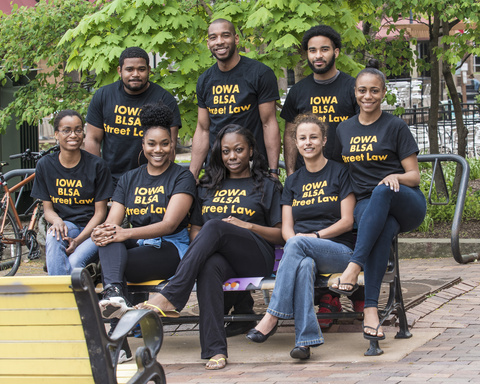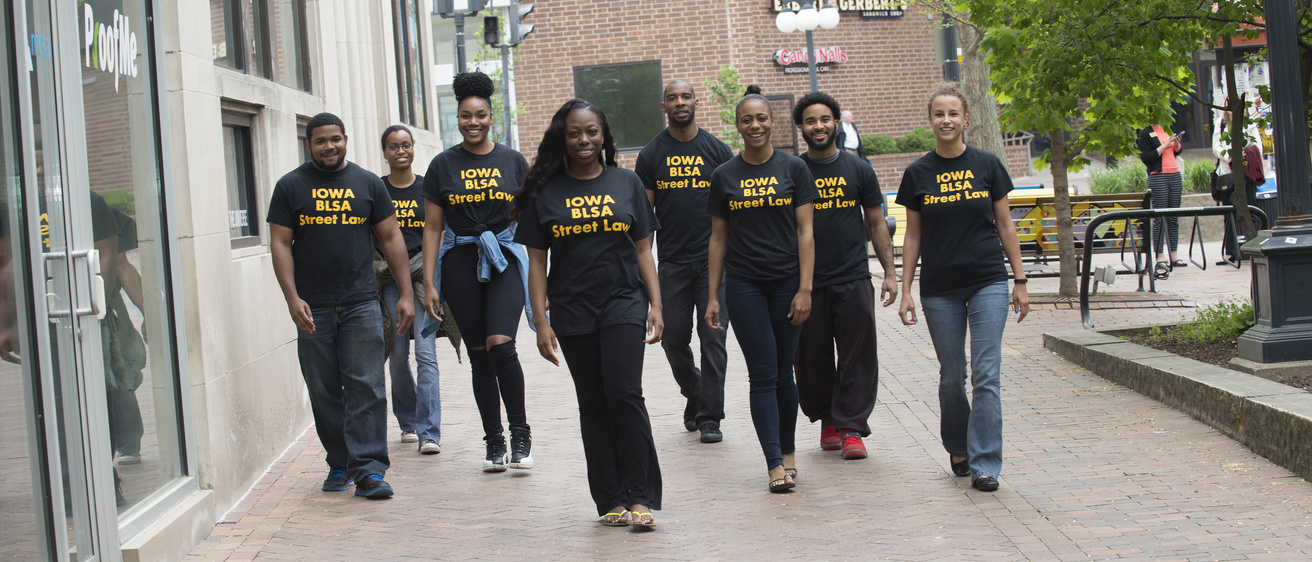The well-reported law enforcement interactions resulting in the killings of people of color—Michael Brown, George Floyd, Breonna Taylor, Ahmaud Arbery, Philando Castile, and countless others—have resulted in important conversations about constitutional rights throughout the United States.
In response to the killing of Michael Brown and the unrest in Ferguson, Missouri in 2014, law students Crystal Pound and Alex Lodge created a Street Law course at Iowa Law. They set out to educate youths about what is permitted from both sides of an interaction with law enforcement, with the hopes it could lead to future de-escalation of similar scenarios in local communities.
In March 2016, the first Street Law class was taught at City High in Iowa City. Street Law continues to be taught at City High and Metro High in Cedar Rapids today.

Street Law was created to educate youths about their Fourth Amendment rights. Specifically with the goal of increasing awareness about what is allowed and prohibited during different types of contact with law enforcement. The curriculum focuses on the changes in power dynamics in four situations where these interactions are most likely to occur: walking in the street, traveling in a vehicle, at school, and at home. By understanding more about how these interactions are supposed to commence, youths are more prepared to appropriately respond and participate in their defense.
Crystal and Alex didn't stop there. Five years later, they continue to build on the Street Law curriculum, recently earning 501(c)3 status for a new Iowa nonprofit – Justice101.
Justice101 partners with local schools to teach young persons of color their constitutional rights under the Fourth Amendment, aiming to alleviate anxieties experienced by youths of color during interactions with law enforcement. It enables youths to contextualize the events that occur during these interactions, understand what their specific rights are, and gives them the confidence to respectfully advocate for these rights at appropriate times.
Forming relationships within the community is an important part of implementing these classes. The people at Justice101 have been reaching out to Iowa schools and other educational organizations that may be interested in teaching this curriculum. Area attorneys come in and speak to participating students and answer any legal questions they may have. They believe when law enforcement and the communities they serve understand each other, de-escalation of unwarranted violent situations can begin.
“Both Street Law and the forming of Justice101 have been such passion projects of mine, and I'm so excited to raise awareness of the program and curriculum. As they say, knowledge is power and in this case, knowledge can be life saving. Interactions with law enforcement are often inherently tense. In these tumultuous times, it's more important than ever to approach law enforcement situations with an open perspective, knowledge of your rights, and a respectful attitude. I look forward to making Justice101 remotely available so all Iowan's, especially youth of color, know the ins and outs of law enforcement interactions,” said Crystal Pound.
Going forward, the co-founders wish to expand their reach by making Street Law classes more accessible. They are currently recording a virtual course and converting their curriculum to a virtual format, that will be available on their website.
Crystal recently wrote a feature article in The Iowa Lawyer (pages 22-23), sharing more about the history of the program and her passion for this new nonprofit.
Cathy Ralfs is a Marketing Intern at the College of Law in External Relations. She is currently studying Marketing Analytics at the University of Iowa, with a minor in Mass Communications. She is an active member of the Marketing Institute at the Tippie College of Business and will be graduating in Spring 2021. Outside of work and school, Cathy loves to stay active and travel.
